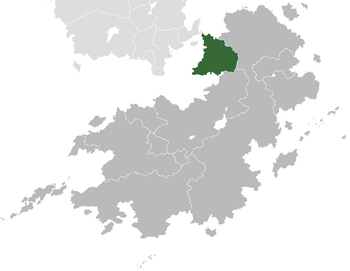Tsabara
Transtsabaran Federation اتحاد ترانستزاباران Al-itihad Ebersabar Fédération Transtsabaran מְדִינַת צָבָּר Medinat Tsabar | |
|---|---|
Coat of arms
| |
 Tsabara in green, Bahia-Coius in dark grey | |
| Capital and largest city | Adunis |
| Official languages | |
| Ethnic groups | |
| Religion | |
| Demonym(s) | Tsabaran |
| Government | Federal constitutional confessionalist presidential republic |
| Atwan al-Tughluq | |
• Premier | Furqaan el-Hashmi |
| Reuven Navon | |
| Legislature | Grand Assembly |
| Independence from Estmere | |
• End of the Estmerish Mandate for Tsabara | 11 March 1942 |
| 26 September 1948 | |
• Socialist Republic proclaimed | 1 October 1948 |
• Democratic constitution | 16 April 1986 |
• Current constitution | 2 February 2018 |
| Area | |
• | 1,563,484 km2 (603,665 sq mi) |
| Population | |
• 2018 estimate | |
• 2014 census | 40,358,063 |
• Density | 27.78/km2 (71.9/sq mi) |
| GDP (PPP) | estimate |
• Total | |
• Per capita | |
| GDP (nominal) | estimate |
• Total | |
• Per capita | |
| Gini | 27.6 low |
| HDI | high |
| Currency | Dinar (TZD) |
| Date format | dd/mm/yyyy |
| Driving side | right |
Tsabara (Tsabari Badawiyan: صبارـبَ Sabara [sˁɑbæ:rɑ], Atudite: צָבָּרא Tsabarah [t͡säbärä:]), officially the Trantsabaran Federation (Badawiyan: اتحاد عبرصبار Al-itihad Ebersabar, Atudite: מְדִינַת צָבָּר Medinat Tsabar [me̞diˈnät t͡säbär];, Gaullican: Fédération Transtsabaran), is a country in Badawiya. Tsabara is bordered to the west by Montecara, to the south by Zorasan, and it shares a maritime border with Florena. The country's proximity to the Aurean Straits give it geostrategic importance. Adunis is the country's capital and largest city, as well as its leading economic, spiritual and cultural centre.
Approximately 40-45% of the country's citizens identify themselves as Badawiyan. Atudites are the largest minority at about 35% of the population; other ethnic minorities include Drapeuntes, Suhalans, Öroqs, Gaibans, Dens, and Larsams. Official languages include Badawiyan and Atudite, while Gaullican is the language of government. Minority languages spoken today in Tsabara include Öroqic, Suhalan, Gaiban, Denic, Larsamic, and several others.
At various points in its history, the region has been inhabited by diverse civilizations including the Larsams, Artics, Demiscians, Solarians, Badawiyans, and Dens. Solarianisation started after the conquest of the area in x BC by the Solarian Republic and continued into the Imperial and Verliquioan eras. Tsabara was a site for the Tagamic migrations and after conquering the land from the Solarians, soon fell to Solarian-Irfanic invasion. It became a cultural and religious centre for the Irfanic faith following the conquest of the region by the First Heavenly Dominion Portions of its coast would shift between hands between the states left in the wake of a unified Irfanic empire and Euclean attempts to retake the 'Holy Land.'
In 18xx, a diplomatic incident and subsequent invasion put the country under the control of the Gaullica. After a failed uprising several years later the Khalji Sultan was deposed and the area formally annexed into Gaullica. During this period Gaullica encouraged immigration of its Atudite minority as well as Gaullicans, who later became known as Drapeuntes. The construction of the Adunis-Abirabe railway was started in Tsabara and considered the top-priority of the colonial regime. Following the Great War’s end in 1936, Tsabara became independent republic after a short mandate period under Estmere, though the Drapeuntes-Atudite led government collapsed following the Solarian War and a socialist republic was formed in 1948. It transitioned to democracy in 1986 after popular protests, with the creation of a confessionalist democratic system. However, in 2016, the country was reformed into a presidential republic under Atwan Al-Tughluq, who has since eroded the multi-faith system toward Badawiyan-Irfanic dominance.
Tsabara is a regional and middle power. It supplies large amounts of natural gas to Euclea, while energy exports and manufactured goods are the backbone of the economy. According to the CN, Tsabara is one of the most unequal societies in the world, with high levels of unequal economic development between the coastal regions and arid interior. Tsabara is a member of the Community of Nations, GIFA, NAC, Aurean Forum and the ITO.
Etymology
History
Classical
Solarian and Verliquioan
Caliphate and the Crusades
Khalji Dynasty
Gaullican Tsabara
Transtabaran Federation
Administrative Divisions
Politics
Government
Tsabara is a federal presidential republic that officially includes confessionalism, in which high-ranking offices are reserved for members of specific religious groups. The President, for example, has to be a Irfanic, the Premier an Atudite, the Speaker of the Parliament a member from any of the Sotirian communities, the Deputy Prime Minister and the Deputy Speaker of Parliament then appointed at the disrection of the president. This system is intended to deter sectarian conflict and to represent fairly the demographic distribution of the largest religious groups. However, following the 2018 reform that turned Tsabara into a presidential republic, the offices of President and Premier have been held by two Irfanics, while the speaker of the assembly is an Atudite, fundamentally damaging the confessionalist system.


